Graham Reid | | 3 min read
Public Enemy: Show 'Em What You Got
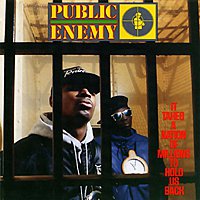
By the late Eighties when this announced itself like a live album with stadium sound from the audience and a siren wail, hip-hop had sprung past the sampling innocence and good times of its early period in Stateside inner-city block parties and cheap steals from bits of vinyl.
Within the first few minutes of this confrontational, sometimes annoying but often brilliant album, the global domination of rap was deliberately confirmed: "Hammersmith Odeon, are you ready for the Def Jam tour . . . in concert with BBC television . . . let me hear you make some noise for Public Enemy . . . "
And when Chuck D says "this time around the revolution will not be televised," he is referencing the classic track by Gil Scott-Heron from the Sixties/Black Power revolutionary period . . . and the white kids in London is gettin' it . . . just as they got Elvis, the Beatles covering Motown and Little Richard, the Clash picking up on the rebel black music of reggae . . .
The revolution may not be televised but it will pick up an audience on the periphery of the broadcast frequency.
And within seconds the Rev Louis Farrakah was also name-checked should you be in doubt. But so was Yoko Ono for the sake of rhyme, whatever that meant, but it didn't matter because there was an angry urgency about this album which was compelling and threatening.
It was all about "bring the noise" with a slash of scratching, Flavor Flav big-upping hisself and a thunderous thump behind Chuck D.
After Bring the Noise -- which must be one of the best start-up tracks on any hip-hop album -- it almost seemed to (literally) fade away when Chuck D came back over the top of a squeal to announce "Bang! . . . I'm not racist . . . preach the peace . . . the minute they see me, they fear me, I'm the epitome of public enemy . . . don't believe the hype . . ."
This was rap as political polemic and as with any such reductive politics it don't bother with nuance and subtlety: that would be a waste of space and time.
Well, maybe we should have taken the time because PE hyped themselves in a disingenuous manner by trying, as the English say, to have a bob each way. Claiming you aren't as bad your enemies say but also pandering to people's worst fears seemed -- even at the time -- utterly dishonest.
And PE certainly were when they came to New Zealand in the late Eighties.
For weeks I tried to get an interview with Chuck D (or indeed anyone in the group) but not one of them wanted to talk to the media. It was better for their hype that they didn't and pretended to be marginalised.
I well remember when they came on stage at the Logan Campbell Centre and claimed "the media tried to stop this show . . . the po-lice tried to stop this show" -- and it was comforting to see many people in the audience (anti-police possibly) looked around and saw a benign police presence there protecting them. And the media had not tried to stop the show but were almost prepared to believe the PA hype.
Never again. *
But that takes nothing away from this exceptional album full of dense beats, Flavor Flav who was at the top of his game as a rhyme-master (he would rarely be again), Chuck D's project of politically-infused hip-hop in the sights, Terminator X sharp on the wheels of steel sampling across genres (speeches by Malcolm X, James Brown, Queen, Slayer, Shaft, David Bowie . . .). And with the Bomb Squad production this was the complete, late Eighties hip-hop package.
Public Enemy just went straight to the jugular, railed against Dead White Writers and journalists, brought the name of John Coltrane back into the forefront, referenced popular culture (the Beastie Boys in Party for Your Right to Fight, Rebel Without A Cause, Night of the Living Dead etc) and sprung hits: Bring the Noise, Don't Believe the Hype, Night of the Living Baseheads and Black Steel in the Hour of Chaos.
This was also music which crossed genre boundaries (see the clip below with PE and Anthrax, which makes perfectly good sense) and took Public Enemy into the vanguard of politicised hip-hop.
You can make the argument that the follow-up Fear of a Black Planet in 1990 was the more politically militant and even a catalyst for some of the riots that followed in parts of black America, but It Takes a Nation of Millions was where the agenda was outlined with clarity.
There could be no turning back for Public Enemy, or hip-hop, after this one.
* In 2004 I did an interview with Chuck D in advance of another tour. It makes interesting reading. Times had changed.
These Essential Elsewhere pages deliberately point to albums which you might not have thought of, or have even heard . . .
But they might just open a door into a new kind of music, or an artist you didn't know of. Or someone you may have thought was just plain boring.
But here is the way into a new/interesting/different music . . .
Jump in.
The deep end won't be out of your depth . . .

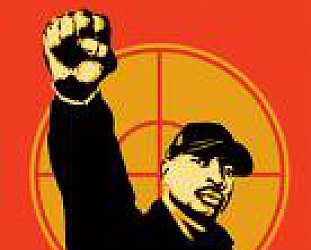
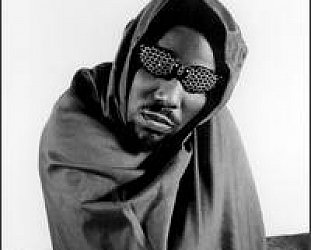
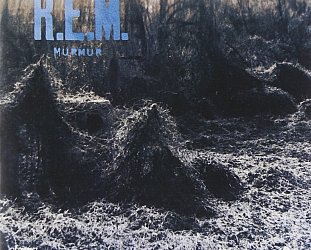
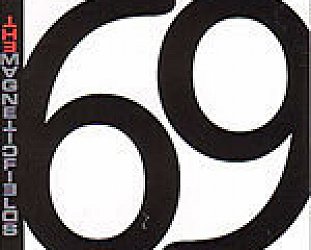


Gavin Hancock - May 19, 2011
Take a listen Eminem, 50 Cent and all you other sucker MCs: this is how it's done. This is your "Sgt. Pepper".
Savepost a comment